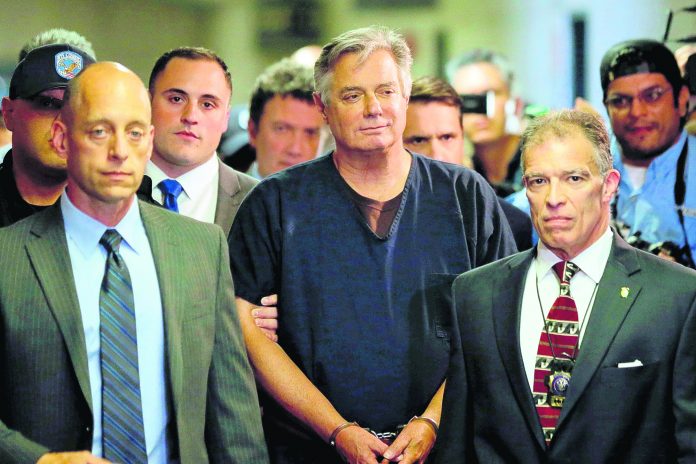
A frail Paul Manafort shuffled into court Thursday in handcuffs and prison garb and pleaded not guilty to New York state mortgage fraud charges that could keep him behind bars even if President Donald Trump pardons him for federal crimes uncovered during the probe of Russian election meddling.
A lawyer for Manafort, the former 2016 Trump campaign chairman turned twice-convicted federal inmate, said he intends to challenge the state case under New York’s strong double jeopardy protections. State law prohibits prosecutors from bringing state charges against a person who has previously been charged for the same conduct under federal law.
“In our views, the laws of New York do not allow the people to do what they did in this case,” lawyer Todd Blanche told reporters after Manafort’s arraignment.
Manafort, wearing a blue prison jumpsuit, walked with a limp as court officers led him down a public hall to and from the courtroom. He had been transferred last week to a federal detention center in New York for his arraignment in the state case.
Manafort, 70, remained seated as he entered his plea and had to be helped out of his chair when taken out of the courtroom. He used a wheelchair at his last federal sentencing in March because of gout.
Manafort is already serving a 7½-year prison sentence for misleading the U.S. government about his lucrative foreign lobbying work, hiding millions of dollars from tax authorities and encouraging witnesses to lie on his behalf.
He is due back in court in the state case on Oct. 9. His lawyers asked if he could skip all pretrial hearings, but Judge Maxwell Wiley said he will decide that on a hearing-by-hearing basis.
Manhattan District Attorney Cy Vance Jr. announced the state charges in March, just minutes after Manafort was sentenced in the second of his two federal cases, saying in a statement at the time: “No one is beyond the law in New York.”
Manafort’s federal cases were byproducts of special counsel Robert Mueller’s probe of Russian influence on the 2016 election, but a judge who presided over one of them made clear that they had nothing to do with Russian election interference, but rather Manafort’s years of “gaming the system.”
The 16-count New York indictment alleges Manafort gave false and misleading information in applying for residential mortgage loans, starting in 2015 and continuing until three days before Trump’s inauguration in 2017. He is also charged with falsifying business records and conspiracy.
Some of the alleged conduct described in the New York indictment echoes the charges and testimony in Manafort’s federal cases.
Paperwork filed by New York prosecutors in connection with Thursday’s arraignment cite admissions Manafort made during his federal trial in Washington in September regarding misrepresentations in mortgage applications for properties in Manhattan and Brooklyn and on Long Island.
Manhattan prosecutors contend their case is safe from a double-jeopardy challenge because mortgage fraud and falsifying business records are state crimes, but not federal crimes.
The president can pardon federal crimes, but not state offenses.
Trump has said he feels “very badly” for Manafort but hadn’t given any thought to a pardon.
In May, New York lawmakers passed a bill to ease the state’s double jeopardy protections and ensure that state prosecutors could pursue charges against anyone granted a presidential pardon for similar federal crimes.
Democratic Gov. Andrew Cuomo supported the legislation but has yet to sign it.
Manafort was sent to a federal prison in Pennsylvania after his last federal sentencing in March. He was expected to be moved to New York City’s notorious Rikers Island jail complex for the state case, but his lawyers complained to federal prison officials that his health and safety could be threatened there.
In conjunction with Manafort’s federal convictions, the U.S. government seized two of his Manhattan properties and put them up for sale. His Trump Tower apartment, a one-bedroom with sweeping views of Central Park, is listed at $3.6 million.q



















